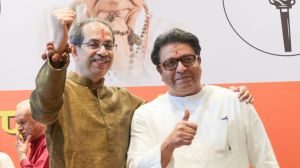* On May 7, the spokesperson for the Chinese foreign ministry described India’s strikes on terrorist training camps in Pakistan and Pakistan-occupied Kashmir as “regrettable”, but said China was ready to work with the international community and “continue to play a constructive role in easing the current tensions”.

“I think we’re going to have a good weekend with China,” US President Donald Trump said.
* On May 9, Chinese President Xi Jinping was in Moscow for Russia’s Victory Day parade, marking the 80th anniversary of the end of World War II.
1. China on Pahalgam terrorism and India’s Op Sindoor
The Chinese spokesperson said, “India and Pakistan are…both China’s neighbours [and] China opposes all forms of terrorism”.
“We urge both sides to act in the larger interest of peace and stability, remain calm, exercise restraint and refrain from taking actions that may further complicate the situation.”
After the terrorist attack on innocent civilians in Pahalgam on April 22, China had offered “condolences to the victims, and express[ed] sincere sympathy to the bereaved families and the injured”.
Story continues below this ad
After the Chinese Foreign Minister Wang Yi spoke to his Pakistani counterpart Mohammad Ishaq Dar, Communist Party mouthpiece Global Times said on April 27, “China is closely following the evolving situation of the tensions between Pakistan and India following the terrorist attack in the Kashmir region, supporting the prompt initiation of an impartial investigation, hoping both sides will exercise restraint, move toward each other, and work to de-escalate tensions.”
Wang described terrorism as a “shared responsibility of all nations”, and said China “consistently supports Pakistan’s firm counter-terrorism actions”, the report said. He underlined China’s steadfast support for Pakistan:
“As an ironclad friend and all-weather strategic cooperative partner, China fully understands Pakistan’s legitimate security concerns and supports its efforts to uphold its sovereignty and security interests.”
On May 8, a Global Times report quoted Qian Feng, director of the research department at the National Strategy Institute at Tsinghua University, as saying that “clashes and friction [between India and Pakistan] are expected to persist”, and “given that both India and Pakistan are nuclear powers, prolonged conflict carries enormous risks”.
Story continues below this ad
UPSHOT: China’s reactions have been in line with its past statements. It has spoken of condemning terrorism but not named Pakistan for its well-documented state support for terrorism and terrorist groups.
Pakistan is dependent on IMF bailouts and Chinese loans for its survival. Beijing has repeatedly thwarted attempts by the United States and India in the United Nations to blacklist Pakistani terrorists such as Sajid Mir, one of the chief planners of the 26/11 Mumbai terror attacks.
2. US-China talks on tariffs
US equity-index futures rose and the dollar strengthened on news of the US-China trade talks, Bloomberg reported. US tariffs on Chinese goods are currently at 145%, and China’s tariffs on American goods at 125%, making trade virtually impossible.
Bessent, 63, told Fox News, “We’ve got to de-escalate before we move forward”, presumably towards a trade deal. The US, he said, wanted “fair trade” with China. Bessent is a key figure in the Trump administration who has argued for lowering the April tariffs on US trade partners.
Story continues below this ad
Chinese Vice Premier He Lifeng, 70, has engaged with Western business leaders and former US Fed chief Janet Yellen in recent months. China’s Ministry of Commerce said, “Any dialogue and negotiation must be carried out on the premise of mutual respect, equal consultation, and mutual benefit. As an old Chinese saying goes, “listen to what someone says and watch what they do.””
The statement warned that “if the US says one thing but does another, or even attempts to use negotiations as a pretext to continue coercive and blackmailing tactics, China will never agree, nor will it sacrifice its principles or international fairness and justice to seek any agreement.”
UPSHOT: A climbdown on tariffs is expected, although there may be no drastic reductions in the short run. Trump has cited wide-ranging issues in trading with China for years, and their resolution may take time.
That said, the contraction reported in the US economy in the first quarter and the concerns over weak domestic consumption in China will nudge both parties towards seeking some relief. A recent Reuters report referred to concern in the Chinese government about the impact of the US tariffs, and the risk of isolation as China’s trading partners negotiated deals with Washington.
Story continues below this ad
3. Xi underlines China-Russia ties
In a signed article in Russian media ahead of his visit to Moscow, President Xi Jinping emphasised the historical roots and strength of China-Russia ties, saying they fought “shoulder to shoulder” against “German Nazism and Japanese militarism”.
He also attempted to draw comparisons to the present: “Eighty years later today, however, unilateralism, hegemonism, bullying, and coercive practices are severely undermining our world.”
Some of these adjectives, such as unilateralism and hegemonism, have frequently been used in Chinese statements to refer to the US.
On Taiwan, Xi wrote: “Taiwan’s restoration to China is a victorious outcome of WWII and an integral part of the postwar international order… No matter how the situation on the Taiwan island evolves or what troubles external forces may make, the historical trend toward China’s ultimate and inevitable reunification is unstoppable.”
Story continues below this ad
UPSHOT: China and Russia have deepened their ties following Russia’s invasion of Ukraine. Russia’s isolation by the West was offset by China. From a few years before 2022 to the present, Russia-China trade has been rising year-on-year.







































